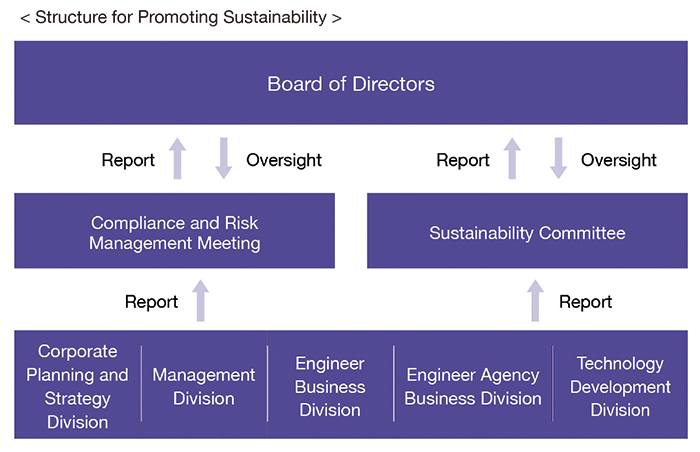Artner’s basic approach to promoting sustainability activities is to support the growth and self-actualization of our engineers based on our management philosophy of being an “Engineer Support Company that supports our engineers’ dreams,” while seeking to maximize enterprise value, contribute to the resolution of social issues through our business activities, and build a foundation for sustainable growth and growth for the next generation. Based on this approach, we have established the following Basic Sustainability Policy as well as a human rights policy, procurement policy, and other policies to clarify the principles and direction of our corporate activities. In addition, considering stakeholder interests and social issues, as well as their impact on our business management, we have identified eight materiality topics (material issues) that should be prioritized and are engaging in effective management practices and business activities to resolve these issues.
To ensure that our sustainability initiatives are accessible to all stakeholders, we provide information in our Annual Report, on our sustainability website, and through other means.
| Cultivating people | To foster engineers to support manufacturing industries. |
|---|---|
| Employee happiness | To provide a workplace environment that makes the work of all employees meaningful and fulfilling. |
| Corporate governance | To sustain and develop positive relationships with all stakeholders, while strictly abiding by all applicable laws and regulations. |
| Contributing to society | To make a positive contribution to society through business, to help build a better and more prosperous world. |
| ESG | Basic policy | Related SDGs | Measures |
|---|---|---|---|
| Environmental |
  |
Providing personnel for technical development of eco cars | |
| Social | Cultivating people |
      |
Providing personnel to support technical development of medical equipment |
| Programming classes for elementary school students | |||
| Helping employees to upgrade their skills through training and education | |||
| New employee training to support career development | |||
| Support system for earning qualifications | |||
| Employee happiness |
Mental health care for employees | ||
| Improving the employment environment to promote active participation of women | |||
| Diversity and LGBTQ+ initiatives | |||
| Establishing a diversity promotion office | |||
| Ensuring diversity and equal opportunity in employment | |||
| Active hiring of people with disabilities | |||
| Contributing to society | Initiatives to clean public spaces | ||
| Governance | Corporate governance |
 |
Elimination of anti-social forces and measures to combat organized crime groups |
Artner sees sustainability issues, including social and environmental issues such as the recent SDGs and ESG, as key management issues, and has established the Sustainability Committee to serve as a structure to promote sustainability management. Under the direct supervision of the Board of Directors, the Committee is responsible for establishing sustainability policies, targets, and action plans, managing and evaluating progress toward these targets, deliberating on individual measures, and reporting to the Board of Directors.
The Committee, chaired by the President and CEO, is composed mainly of Directors who are not members of the Audit and Supervisory Committee, Directors who are members of the Audit and Supervisory Committee, and division heads and managers, and is held four times a year.

Considering stakeholder interests and social issues, as well as their impact on our business management, we have identified eight materiality topics (material issues) that should be prioritized. Based on our understanding of the importance of the materiality topics we have identified, we will engage in effective management practices and business activities to resolve these issues.
In addition to clarifying the system for the overall management of various risks, we classify and define each business risk by type and have the department in charge of each type of risk monitor and analyze the risk situation. We also have a system in place for the overall management of various types of risks through the Compliance and Risk Management Meeting, where we clarify and monitor the management and countermeasures for each type of risk.
We have categorized the eight materiality topics (material issues) into three areas (Environment, Social, and Governance), and set and monitor KPIs and targets for each issue. These indicators and targets are deliberated on and evaluated by the Sustainability Committee, then reported to the Board of Directors by the President and CEO, who chairs the Sustainability Committee. We review these materiality topics (material issues), indicators, and targets as necessary, based on the business environment and awareness of the issues.
*For materiality (material issues) KPIs, targets, and results, see “Non-financial Data (KPIs, Targets, and Results)” on pages 61 and 62.